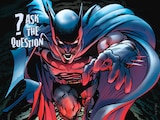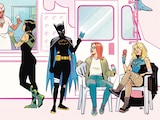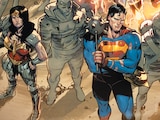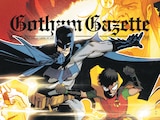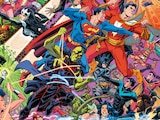Pop culture is filled with heroes, villains and antiheroes, but Booster Gold is on a spectrum all his own. Don’t get me wrong, he’s a hero, but he doesn’t quite fit into the mold of traditional heroism like Superman, Batman or Wonder Woman. Booster Gold is unique within the DC Universe, and that’s why he’s the perfect hero to take the screen in a new DC Studios TV series.
But I’m getting ahead of myself. Some of you might not know who Booster Gold is, but in a few short years, he’s likely to be a household name. So, if you’re unfamiliar with Booster, but want to be an expert ahead of all your friends, let me help you get to know the chronologically-displaced hero and break down why he’s such a great choice for DC Studios.
Michael Jon Carter was a 25th century athlete who had fallen on bad times. After his football career ended in disgrace, he took a low paying job at the Metropolis Space Museum. Wishing to escape from his humdrum life, Michael stole some of the superhero artifacts on display there and traveled back to the 20th century. Using technology from the stolen artifacts, Michael appeared to have superpowers.
He adopted the identity Goldstar, but a misunderstanding caused the media to call him Booster Gold and it stuck. Booster’s greatest tool was Skeets, a robot he brought along from the future. Thanks to Skeets’ historical records, Booster was able to anticipate disasters so he could show up and save the day. Think of Skeets this way—imagine what it would be like if you brought Siri or Alexa back in time to the Civil War.
Michael used his identity as Booster to seek fame and fortune. Forget the modesty that heroes like Green Lantern or Flash have. Booster took every endorsement deal offered to him, and he never met a camera he didn’t like. Of course, you can’t be a hero in the DC Universe without experiencing tragedy at some point or another and Booster is no exception. Over time, Michael has grown into a more traditional and altruistic superhero, but he’s never completely left behind his showboat roots.
If you want to learn more about Booster, his original 1986 series is the best place to start. Booster also had a big role in the 52 maxi-series. That series broke Booster down as a hero and it serves as a great character study. It’s also the series where I first fell in love with him. Booster Gold’s 2007 series follows the hero as he time-travels through some of DC’s greatest eras and it’s also pretty fun. You check out those three books between now and Booster’s small screen debut and you’ll be in pretty good shape when it comes to understanding who he is.
Now let’s look at what DC Studios heads Peter Safran and James Gunn said about Booster when they unveiled phase one of their DC Studios slate.
“A total fan favorite, as you know,” said Safran. “A loser from the future who uses his basic future technology to come back to today to pretend to be a superhero.”
“I think of it as basically the story of a superhero’s imposter syndrome,” Gunn added. “How do you deal with that? (It’s about) how he tries to use this future technology to be loved by the people of today and what is really at the base of that. It’s a character story that’s going to be a very different type of show.”
Let’s key in on something they both touched on—imposter syndrome. Safran called Booster somebody pretending to be a superhero. This is an interesting thread to pull on. At what point is a pretend hero considered a real one? How many people do they have to save? Does your motivation determine if you’re a hero? If Booster saves a busload of children, is he any less of a hero because he only did it for the cameras? I know I’m asking a lot of questions, but these are fascinating threads to explore.
The important takeaway is that Michael can’t help but see himself as a “pretend hero.” If you’re not familiar with imposter syndrome, it’s a constant self-doubt of your own talents and a fear that you’ll be exposed as a fraud. It’s a fair assumption that many of you have probably suffered from imposter syndrome at one point or another. I know I have and so have most of my peers.
Booster’s imposter syndrome is the reason I don’t consider him a traditional antihero. Many of the antiheroes we see in media are very sure of themselves, although there are exceptions. I can’t pretend that I speak for the entire human race, but I feel like imposter syndrome is a prevalent feeling in our generation, and as a result, many viewers will find that they can relate to Booster Gold. It’s all about the anxiety. I’ve never battled Darkseid, but I’ve definitely had my moments of fighting anxiety.
Imagine standing alongside Batman as you prepare to fight an alien warlord. Wouldn’t you suffer from imposter syndrome in that situation? Honestly, it’s probably impossible to stand next to the Dark Knight without getting at least a touch of it. Batman is the hero we wish we could be, while for most of us, Booster is the hero we are. What would you do if you had access to a time machine? Maybe you would use it for altruistic purposes, but there would probably be a temptation to use it for fun, fame and fortune.
This is ultimately why Booster Gold stands apart from the other heroes of the DC Universe. Some heroes are born from tragedy, others are inspired to do good, while Booster is initially driven by his own selfish desires. He’s a different kind of hero, and yes, despite his own self-doubts, he does grow to become someone who cares about more than his own well-being.
Booster Gold is a relatable hero for our modern times. I have no clue what will be happening in his upcoming HBO Max series, but I don’t need a time machine to know that you’re going to love it.
Joshua Lapin-Bertone writes about TV, movies and comics for DC.com, is a regular contributor to the Couch Club and writes our monthly Batman column, "Gotham Gazette." Follow him on Twitter at @TBUJosh.
NOTE: The views and opinions expressed in this feature are solely those of Joshua Lapin-Bertone and do not necessarily reflect those of DC Entertainment or Warner Bros.




